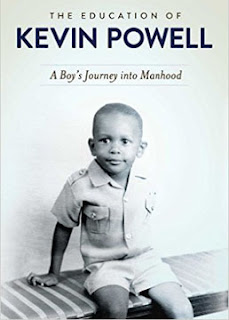Democracy in Black: How Race Still Enslaves the American Soul
By Eddie S. Glaude Jr
Part manifesto, part history, part memoir, it argues that we live in a country founded on a “value gap”—with white lives valued more than others—that still distorts our politics today. Whether discussing why all Americans have racial habits that reinforce inequality, why black politics based on the civil-rights era have reached a dead end, or why only remaking democracy from the ground up can bring real change, Glaude crystallizes the untenable position of black America--and offers thoughts on a better way forward. Forceful in ideas and unsettling in its candor, Democracy In Black is a landmark book on race in America, one that promises to spark wide discussion as we move toward the end of our first black presidency.
* * * * *
Will Racism Ever End,
Will I Ever Stop Being a Nigger?
By Kevin Powell
Finally, we have heard for years, at least going back to the presidency of Bill Clinton, this call for a national conversation on race. What I have come to realize is that that is a political football for certain kinds of political leaders to toss about when there is yet another racially motivated tragedy in our America. That if there is truly is to be a conversation, a raw and real dialogue, that it must come from the bottom up, from we the people. I’ve said all I can say about America, about American history, about what racism has done to me, to my family. I am drained and near tears, to be downright honest, from writing this piece, because it forced me to revisit both new and old traumas, to revisit new and old wars with myself, with others, wars that I really do not want to fight. I want to heal; I want us all to heal.
This healing work must happen with White sisters and brothers and it must happen with Black sisters and brothers, and sisters and brothers of every racial and cultural upbringing in America. Protests, rallies, marches should continue to happen as long as racism exists, as long as there is inequality, injustice, and the absence of opportunities for all people. They must. But we also must be conscious of how this racism cancer eats at us, how it destroys us from the inside out, how we must learn the difference between proactive anger and reactionary anger. Proactive anger builds bridges, possibilities, alliances, movements, and, ultimately, love. Reactive anger destroys bridges, breeds dysfunction, and spreads more madness and confusion. Yes, passion is necessary, and we should be angry because of what I have described in this essay, for it is a natural human emotion. But that anger must not become the very hate we say we are against.
* * * * *
The Education of
Kevin Powell
A Boy's Journey into Manhood
A Boy's Journey into Manhood
By Kevin Powell
In the traditions is a good
collection of poetry and short stories from african americans from the early
90's. Some of the writers included are even more known today for some of their
other works since this collection was written. . . . Wow! Ten years have past
and this collection can still hold its own! I can across it during a sociology
class--it offers a vivid snapshot of a generation of thinkers. Many like Powell
and Anderson-Thompkins have gone on to write books and articles about race.
* * * * *
Ivanhoe Donaldson
October 17, 1941 –
April 3, 2016
Raised in New York City, New York
Raised in New York City, New York
Although he did not have direct experience with life in the rural south, Donaldson understood the potential of Black voter registration and decided to organize food and medical assistance. After a supply drive on campus, Donaldson rented a truck, loaded it with over-the-counter medicines, and along with fellow student Ben Taylor, drove down to Mississippi. Reaching Clarksdale after a long day’s drive, the two fell asleep in their truck and were awakened by the police. The policemen found aspirin and vitamins in a search of the vehicle and arrested Donaldson and Taylor.
The two spent a week in jail before the NAACP bailed them out on a $15,000 bond. Donaldson’s arrest convinced him to commit to working full-time in the Movement. In 1963, he began working in Mississippi as a SNCC field secretary. While registering people to vote, a police officer threw Donaldson in the back of his car and shoved a pistol in his mouth. In that moment, Donaldson thought, “this guy [is] going to blow me away.” Such experiences with violence were routine for SNCC field secretaries; the youthful organization had more field workers than any other in the civil rights establishment.
Like many Mississippi field secretaries, Donaldson initially opposed the Freedom Summer Project. He wanted to prioritize the empowerment of local people and was concerned that northern volunteers would take leadership roles away from local Blacks just beginning their involvement with the Movement. He also criticized some other movement strategies. When asked about the March on Washington and similar demonstrations, he said, “They created a lot of hoopla, a lot of drama, but didn’t accomplish much.”
These concerns notwithstanding, Donaldson remained committed to SNCC.
He was
campaign manager for Julian Bond’s 1965 successful campaign for a seat in the Georgia state legislature and was SNCC’s point person
at the Selma-to-Montgomery
march. After the passage of the Civil Rights and Voting Rights Acts, Donaldson
urged SNCC to place more emphasis on economic justice, opposition to the
Vietnam War and international solidarity. http://onevotesncc.org/profile/ivanhoe-donaldson/






No comments:
Post a Comment